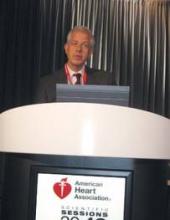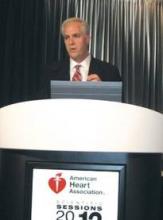LOS ANGELES – Two different monoclonal antibodies showed potent activity for safely cutting blood levels of low-density lipoprotein cholesterol in results from five phase II studies reported at the annual scientific sessions of the American Heart Association.
The findings showed that at the highest dosages tested, both antibodies roughly matched the LDL cholesterol lowering achieved by the highest approved dosages of potent statins, and the antibodies’ effects appeared additive to those of statins when physicians prescribed the two classes in tandem. Because they are antibodies, the new agents are administered by subcutaneous injection or intravenous infusion every 2 or 4 weeks.
While phase III trial results and Food and Drug Administration consideration are a few years down the road, many physicians were buoyed by the prospect of soon being able to treat selected patients with a second 50% reduction in LDL on top of the first 50% drop delivered by statins. Treatment with one of the new antibodies, directed against the plasma protein convertase subtilisin/kexin type 9 (PCSK9) that reduces LDL cell-receptor numbers, leads to increased receptor levels that can halve LDL levels.
Antibodies that inhibit PCSK9 offer a "new paradigm for reducing LDL cholesterol," said Dr. Robert P. Giugliano, who reported data from the largest of the four trials that treated 474 patients with subcutaneous injection of the Amgen 145 antibody either every 2 or 4 weeks.
"We are witnessing the birth of a new treatment. Never have I seen the goal attainments in the lipid area" shown by some of the reports, commented Dr. John J.P. Kastelein, professor and chair of the department of vascular medicine at the Academic Medical Center in Amsterdam. In the results reported by Dr. Giugliano, for example, 90% of patients who received the highest tested antibody dosage every 2 weeks reached their LDL cholesterol goal of less than 70 mg/dL.
Four of the five studies reported at the meeting involved the Amgen 145 antibody:
• The largest of the trials, LAPLACE-TIMI 57 (LDL-C Assessment with PCSK9 Monoclonal Antibody Inhibition Combined with Statin Therapy), treated 631 patients who had LDL cholesterol levels of at least 85 mg/dL despite being on a stable statin regimen that for some patients also included ezetimibe. Patients received one of three subcutaneous dosages of Amgen 145 or placebo either every 2 or 4 weeks for 12 weeks. The study’s primary end point was the percent change in LDL cholesterol during 12 weeks on treatment. Among the 78 patients who received the largest antibody dosage every 2 weeks, average LDL levels fell by 66%, reported Dr. Giugliano, a cardiologist at Brigham and Women’s Hospital in Boston.
None of the 474 total patients who received the Amgen 145 antibody stopped receiving the drug because of a serious adverse event. Four of the 474 patients had a creatine kinase elevation greater than five times the upper limit of normal. None had a liver enzyme elevation greater than three times the upper limit of normal. Results from the study were published online concurrent with Dr. Giugliano’s report at the meeting (Lancer 2012;380 [doi: 10.1016/S0140-6736(12)61770-X]).
• A second trial with the same antibody, MENDEL (Monoclonal Antibody Against PCSK9 to Reduce Elevated LDL-C in Patients Currently Not Receiving Drug Therapy for Easing Lipid Levels), enrolled 411 people who were not on any other lipid-lowering medication and who did not have clinical conditions that mandated lipid-reduction treatment so that the impact of the antibody could be assessed in isolation. The highest antibody dosage tested, 140 mg administered subcutaneously every 2 weeks (the same as the highest dosage tested in LAPLACE-TIMI 57), produced an average 51% reduction in LDL cholesterol during 12 weeks of treatment, reported Dr. Michael J. Koren, chief executive officer of the Jacksonville (Fla.) Center for Clinical Research. Among all the dosages tested, administered either every 2 or 4 weeks, average LDL cholesterol levels fell by at least 39%.
None of the antibody-treated patients had a treatment-related adverse event that led to drug discontinuation. Four patients among the 271 who received the antibody had a creatine kinase elevation more than five times the upper limit of normal, as did 2 of the 90 patients who received placebo. Results from the study were published online concurrent with Dr. Koren’s report at the meeting (Lancet 2012;380 [doi: 10.1016/S0140-6736(12)61771-1]).




